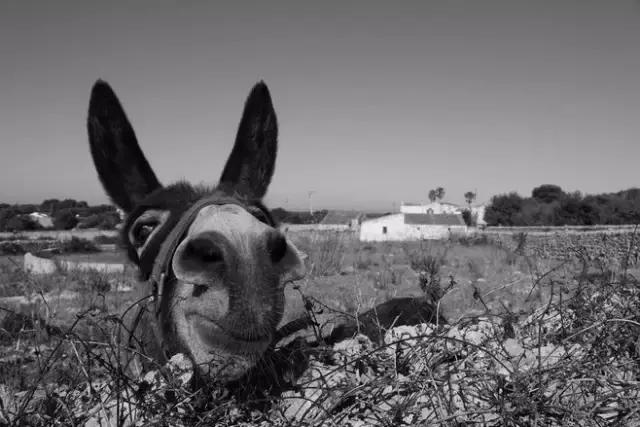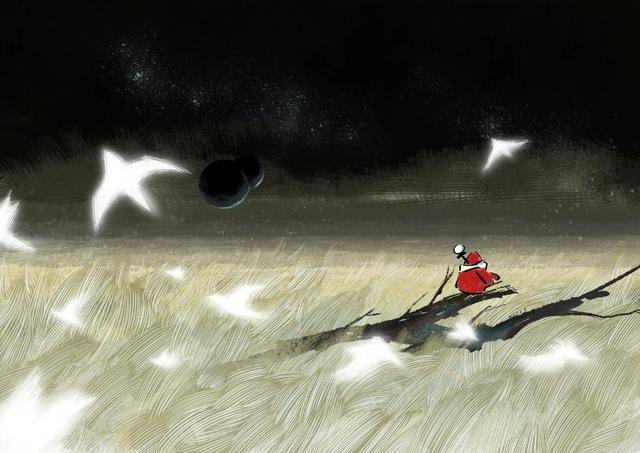

Chinese idioms and fables来自英语共读00:0008:04
Chinese idioms and fables
汉语成语和寓言故事
Being an important part of the Chinese language and culture, Chinese idioms and fables are precious gems of Chinese wisdom. As a matter of fact, almost every Chinese idiom has a story behind it.
汉语成语和寓言故事是中国语言文化和智慧宝库中耀眼夺目的璀璨明珠。事实上,每则成语皆有一段典故。
狐假虎威
The Fox Borrows the Tiger's Terror

One day a tiger was hunting around in a forest. An unlucky fox was caught by the tiger.
For the fox, the inescapable fate was very clear - death. Despite the danger, the fox thought hard to find a way out. Promptly, the fox declared to the tiger, "How dare you kill me!"
黔驴技穷
The Donkey of Guizhou

Thousands of years ago, there was no donkey in Guizhou Province. So someone officious shipped one there. But finding no use for it, he set it loose at the foot of the mountain.
One day, a tiger was walking around to find something to eat, when he saw the strange animal. The huge new comer frightened him quite a bit. He hid himself in the bushes and studied the donkey watchfully. It seemed all right. So the tiger came near to the donkey to have a close look. "Hawhee…" a loud noise burst out, which sent the tiger running away as fast as he could. He could not have any time to think before he settled himself home. The humiliation stung in him. He must come back to that strange thing to see it clearly though he was still haunted by the terrible noise.
The donkey was enraged when the tiger got too close. So the donkey brought his unique skill to bear on the offender - to kick with his hooves. After several bouts, it became very clear that what the donkey had was so much. The tiger jumped upon the donkey in time, cut its throat, and ate it up.
过去贵州(黔)这个地方没有驴。有好事者用船运来了一头驴,运来后却没有什么用处,就把驴放到山脚下。
一只老虎看见了驴,以为这个躯体高达的家伙一定很神奇,就躲在森林里偷偷观察着,后来悄悄走出来,小心翼翼地接近驴,想看看仔细。
这时,驴叫了一声,老虎大吃一惊,远远躲开,以为驴要咬自己了,非常恐惧。然而,老虎反复观察以后,觉得驴并没有什么特殊本领,而且越来越熟悉驴的叫声了。
老虎接着走到驴的周围,在它身边转来转去,还不敢上去攻击驴。后来,老虎慢慢逼近驴,越来越放肆,或者碰它一下,或者靠它一下,不断冒犯它。驴非常恼怒,就用蹄子去踢老虎。
老虎心里盘算着:“你的本事也不过如此罢了!”非常高兴。于是,老虎腾空扑去,咬断了驴的喉管,啃完了驴肉,才离去。
《三戒·黔之驴》: "形之庞也类有德,声之宏也类有能。向不出其技,虎虽猛,疑畏,卒不敢取。今若是焉,悲夫!"
人们常用这个故事来比喻有限的本领已经用尽,再没有别的办法了。
井底之蛙
The Frog in the Shallow Well

Have you not heard of the frog that lived in a shallow well? It said to a turtle that lived in the East Sea, "I am so happy! When I go out, I jump about on the railing beside the mouth of the well. When I come home, I rest in the holes on the broken wall of the well. If I jump into the water, it comes up to my armpits and holds up my cheeks. If I walk in the mud, it covers up my feet. I look around at the wriggly worms, crabs and tadpoles, and none of them can compare with me. Moreover, I am the lord of this trough of water and I stand up tall in this shallow well. My happiness is full. My dear sir, why don't you come often and look around my place?"
Before the turtle from the East Sea could get its left foot in the well, its right knee got stuck. It hesitated and retreated. The turtle told the frog about the East Sea.
"Even a distance of a thousand li cannot give you an idea of the sea's width; even a height of a thousand zhang cannot give you an idea of its depth. In the time of King Yu of the Xia Dynasty, there were floods nine years out of ten, but the waters in the sea did not increase. In the time of King Tang of the Shang Dynasty there were droughts seven years out of eight, but the waters in the sea did not decrease. The sea does not change along with the passage of time and its level does not rise or fall according to the amount of rain that falls. The greatest happiness is to live in the East Sea."
After listening to these words, the frog of the shallow well was shocked into realization of his own insignificance and became very ill at ease.
一口废井里住着一只青蛙。有一天,青蛙在井边碰上了一直从海里来的大龟。
青蛙就对海龟夸口说:“你看,我住在这里多快乐!有时高兴了,就在井栏边跳跃一阵;疲惫了,就回到井里,在砖洞边睡一觉。或者只留出头和嘴巴,安安静静地全身泡在水里,或者在软绵绵的泥浆里散一会儿步,也很舒适。看看那些小虫、蟹和蝌蚪,谁也比不上我。而且,我是这口井里的主人,在这井里及其自由自在,你为什么不常到井里来有赏呢!”
那海龟听了青蛙的话,倒真想进去看看。但它的左脚还没有整个伸进去,右脚就已经被卡住了。它连忙后退了两步,把大海的情形告诉了青蛙:“你看过海吗?海的广大,哪止千里;海的深度,哪止千丈。夏朝禹王时,十年有九年大水,海里的水,并没涨多少;商朝汤王时,八年里有七年大旱,海里的水,也未见浅多少。可见大海是不受旱涝影响的。住在那样的大海里,才是真的快乐呢!”
井蛙听了海龟的一番话,吃惊地待在那里,再也没有话可说了。
《庄子·秋水》:“井蛙不可以语于海者,拘于虚也。”
“井底之蛙”比喻那些见识短浅的人。
Word bank
gem: n. 宝石,珍宝
accredit: v. 委托,授权
suspicious: adj. 猜疑的,怀疑的
officious: adj. 爱管闲事的
humiliation: n. 羞辱
enrage: v. 使暴怒
tadpole: n. 蝌蚪
retreat: v. 后退
drought: n. 干旱,旱季
shallow: adj. 肤浅的
,




